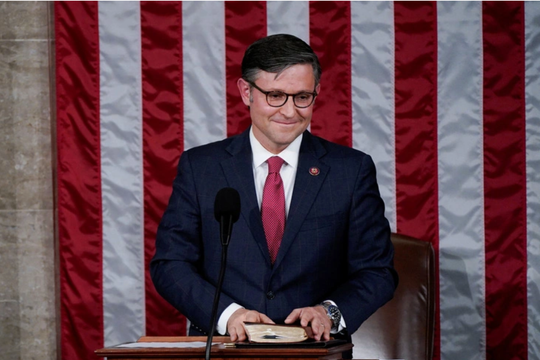US House passes spending bill to prevent government shutdown
(Baonghean.vn) - The US House of Representatives on November 14 (local time) passed a temporary measure to prevent a partial shutdown of the federal government. According to Reuters, many bipartisan lawmakers from both the Democratic and Republican parties expressed support for this bill.

The short-term bill now moves to the Senate, where Democratic and Republican leaders have also voiced support for the bill.
To prevent a shutdown, the Republican-controlled US Senate and House of Representatives must enact legislation that President Joe Biden can sign into law before current funding for federal agencies expires at midnight on November 17.
With a 336-95 vote, the recent vote was seen as a victory for House Speaker Mike Johnson, who faced opposition from some members of his own Republican party, in the first important vote of his term as House Speaker.
Mr. Johnson was elected to the position less than three weeks ago, after weeks of turmoil left the House leaderless. With a slim 221-213 majority, he can afford to lose no more than three Republican votes on legislation that Democrats oppose.
The temporary spending bill would extend government funding at current levels through 2024, giving lawmakers more time to craft detailed spending bills covering everything from the military to scientific research.
Some Republicans on the party's right wing said they were disappointed that it did not include the deep spending cuts and border security measures they had hoped for.
Mr Johnson's predecessor as Speaker of the House, Kevin McCarthy, was ousted by a group of Republicans after a similar vote in September. That vote relied on Democratic votes to prevent a government shutdown.
But hardline conservatives say they are not turning their backs on Mr Johnson. “We don’t support that,” said Representative Bob Good. “But we are very supportive of him.”
Johnson’s bill would extend funding for military construction, veterans’ benefits, transportation, housing, urban development, agriculture, the Food and Drug Administration, and energy and water programs through Jan. 19. Funding for all other federal activities, including defense, expires Feb. 2.
The US Congress is in a financial deadlock for the third time this year, following a months-long standoff in the spring over the US's more than $31 trillion public debt, which left the federal government on the brink of default.
The ongoing partisan gridlock prompted Moody's to downgrade the outlook for the US credit rating from "stable" to "negative" last Friday, as it noted that high interest rates would continue to push borrowing costs higher.




